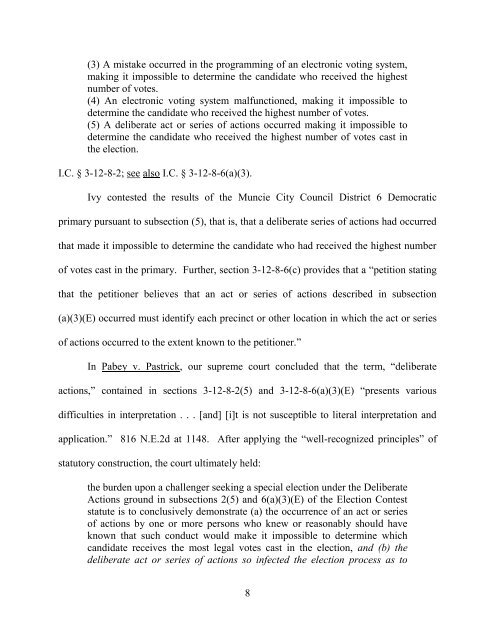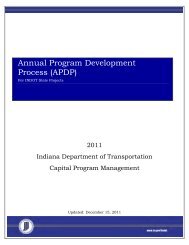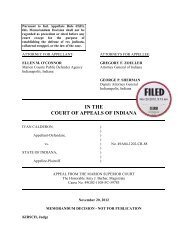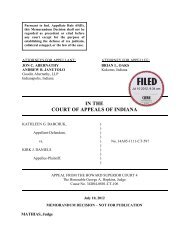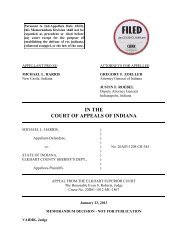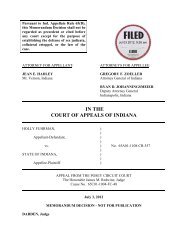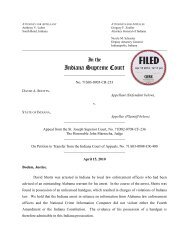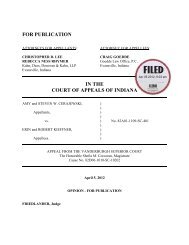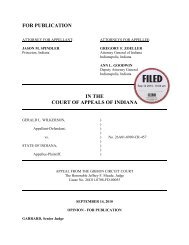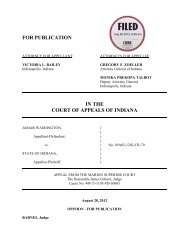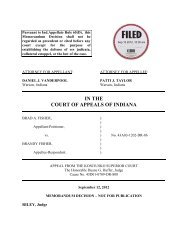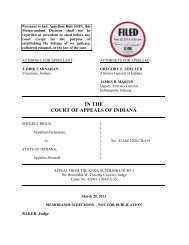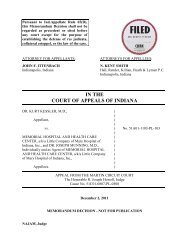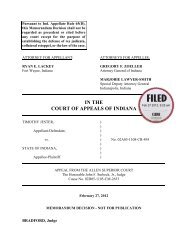Julius J. Anderson v. Richard M. Ivy - State of Indiana
Julius J. Anderson v. Richard M. Ivy - State of Indiana
Julius J. Anderson v. Richard M. Ivy - State of Indiana
Create successful ePaper yourself
Turn your PDF publications into a flip-book with our unique Google optimized e-Paper software.
(3) A mistake occurred in the programming <strong>of</strong> an electronic voting system,<br />
making it impossible to determine the candidate who received the highest<br />
number <strong>of</strong> votes.<br />
(4) An electronic voting system malfunctioned, making it impossible to<br />
determine the candidate who received the highest number <strong>of</strong> votes.<br />
(5) A deliberate act or series <strong>of</strong> actions occurred making it impossible to<br />
determine the candidate who received the highest number <strong>of</strong> votes cast in<br />
the election.<br />
I.C. § 3-12-8-2; see also I.C. § 3-12-8-6(a)(3).<br />
<strong>Ivy</strong> contested the results <strong>of</strong> the Muncie City Council District 6 Democratic<br />
primary pursuant to subsection (5), that is, that a deliberate series <strong>of</strong> actions had occurred<br />
that made it impossible to determine the candidate who had received the highest number<br />
<strong>of</strong> votes cast in the primary. Further, section 3-12-8-6(c) provides that a “petition stating<br />
that the petitioner believes that an act or series <strong>of</strong> actions described in subsection<br />
(a)(3)(E) occurred must identify each precinct or other location in which the act or series<br />
<strong>of</strong> actions occurred to the extent known to the petitioner.”<br />
In Pabey v. Pastrick, our supreme court concluded that the term, “deliberate<br />
actions,” contained in sections 3-12-8-2(5) and 3-12-8-6(a)(3)(E) “presents various<br />
difficulties in interpretation . . . [and] [i]t is not susceptible to literal interpretation and<br />
application.” 816 N.E.2d at 1148. After applying the “well-recognized principles” <strong>of</strong><br />
statutory construction, the court ultimately held:<br />
the burden upon a challenger seeking a special election under the Deliberate<br />
Actions ground in subsections 2(5) and 6(a)(3)(E) <strong>of</strong> the Election Contest<br />
statute is to conclusively demonstrate (a) the occurrence <strong>of</strong> an act or series<br />
<strong>of</strong> actions by one or more persons who knew or reasonably should have<br />
known that such conduct would make it impossible to determine which<br />
candidate receives the most legal votes cast in the election, and (b) the<br />
deliberate act or series <strong>of</strong> actions so infected the election process as to<br />
8


